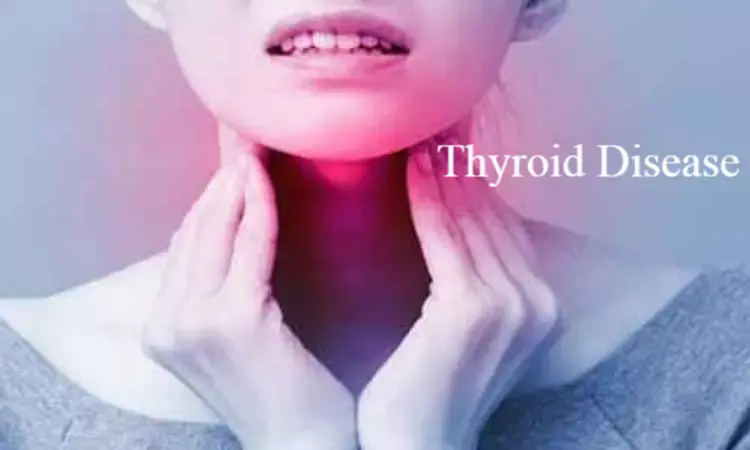- Home
- Medical news & Guidelines
- Anesthesiology
- Cardiology and CTVS
- Critical Care
- Dentistry
- Dermatology
- Diabetes and Endocrinology
- ENT
- Gastroenterology
- Medicine
- Nephrology
- Neurology
- Obstretics-Gynaecology
- Oncology
- Ophthalmology
- Orthopaedics
- Pediatrics-Neonatology
- Psychiatry
- Pulmonology
- Radiology
- Surgery
- Urology
- Laboratory Medicine
- Diet
- Nursing
- Paramedical
- Physiotherapy
- Health news
- Fact Check
- Bone Health Fact Check
- Brain Health Fact Check
- Cancer Related Fact Check
- Child Care Fact Check
- Dental and oral health fact check
- Diabetes and metabolic health fact check
- Diet and Nutrition Fact Check
- Eye and ENT Care Fact Check
- Fitness fact check
- Gut health fact check
- Heart health fact check
- Kidney health fact check
- Medical education fact check
- Men's health fact check
- Respiratory fact check
- Skin and hair care fact check
- Vaccine and Immunization fact check
- Women's health fact check
- AYUSH
- State News
- Andaman and Nicobar Islands
- Andhra Pradesh
- Arunachal Pradesh
- Assam
- Bihar
- Chandigarh
- Chattisgarh
- Dadra and Nagar Haveli
- Daman and Diu
- Delhi
- Goa
- Gujarat
- Haryana
- Himachal Pradesh
- Jammu & Kashmir
- Jharkhand
- Karnataka
- Kerala
- Ladakh
- Lakshadweep
- Madhya Pradesh
- Maharashtra
- Manipur
- Meghalaya
- Mizoram
- Nagaland
- Odisha
- Puducherry
- Punjab
- Rajasthan
- Sikkim
- Tamil Nadu
- Telangana
- Tripura
- Uttar Pradesh
- Uttrakhand
- West Bengal
- Medical Education
- Industry
Graves' disease patients likely to encounter hematoma and hypocalcemia after thyroidectomy

Recent research has revealed that patients with Graves' disease undergoing thyroidectomy are more likely to suffer from postoperative hematoma and hypocalcemia compared to patients undergoing surgery for other indications.
The study is published in the Annals of Otology, Rhinology & Laryngology.
Sadaf Mohtashami and colleagues from the Department of Otolaryngology—Head and Neck Surgery, McGill University, Montreal, QC, Canada carried out the present study to examine the association of Graves' disease with the development of postoperative neck hematoma.
A cohort of patients participating in the Thyroid Procedure-Targeted Database of the National Surgical Quality Improvement Program was formulated. 17 906 patients who underwent thyroidectomy were included.
Propensity score matching was performed to adjust for differences in baseline covariates. Multivariate logistic regression was used to ascertain the association between thyroidectomy for Graves' disease and risk of postoperative adverse events within 30 days of surgery. The primary outcome was postoperative hematoma. Secondary outcomes were postoperative hypocalcemia and recurrent laryngeal nerve injury.
The following findings were seen-
- One-to-three propensity score matching yielded 1207 patients with mean age (SD) of 42.6 (14.9) years and 1017 (84.3%) female in the group with Graves' disease and 3621 patients with mean age (SD) of 46.7 (15.0%) years and 2998 (82.8%) female in the group with indications other than Graves' disease for thyroidectomy.
- The cumulative 30-day incidence of postoperative hematoma was 3.1% (38/1207) in the Graves' disease group and 1.9% (70/3621) in other patients.
- The matched cohort showed that Graves' disease was associated with higher odds of postoperative hematoma (OR 1.65, 95% CI 1.10-2.46) and hypocalcemia (OR 2.04, 95% CI 1.66-2.50) compared with other indications for thyroid surgery.
- There was no difference in recurrent laryngeal nerve injury among the 2 groups.
Hence, the authors concluded that "patients with Graves' disease undergoing thyroidectomy were more likely to have a postoperative neck hematoma and hypocalcemia compared to patients undergoing surgery for other indications. The results suggest that the primary indication for thyroid surgery has an impact on postoperative outcome. These findings may guide surgeons to preferentially monitor patients with Graves' disease undergoing thyroidectomy, particularly those with multiple risk factors."
Dr. Nandita Mohan is a practicing pediatric dentist with more than 5 years of clinical work experience. Along with this, she is equally interested in keeping herself up to date about the latest developments in the field of medicine and dentistry which is the driving force for her to be in association with Medical Dialogues. She also has her name attached with many publications; both national and international. She has pursued her BDS from Rajiv Gandhi University of Health Sciences, Bangalore and later went to enter her dream specialty (MDS) in the Department of Pedodontics and Preventive Dentistry from Pt. B.D. Sharma University of Health Sciences. Through all the years of experience, her core interest in learning something new has never stopped. She can be contacted at editorial@medicaldialogues.in. Contact no. 011-43720751
Dr Kamal Kant Kohli-MBBS, DTCD- a chest specialist with more than 30 years of practice and a flair for writing clinical articles, Dr Kamal Kant Kohli joined Medical Dialogues as a Chief Editor of Medical News. Besides writing articles, as an editor, he proofreads and verifies all the medical content published on Medical Dialogues including those coming from journals, studies,medical conferences,guidelines etc. Email: drkohli@medicaldialogues.in. Contact no. 011-43720751


